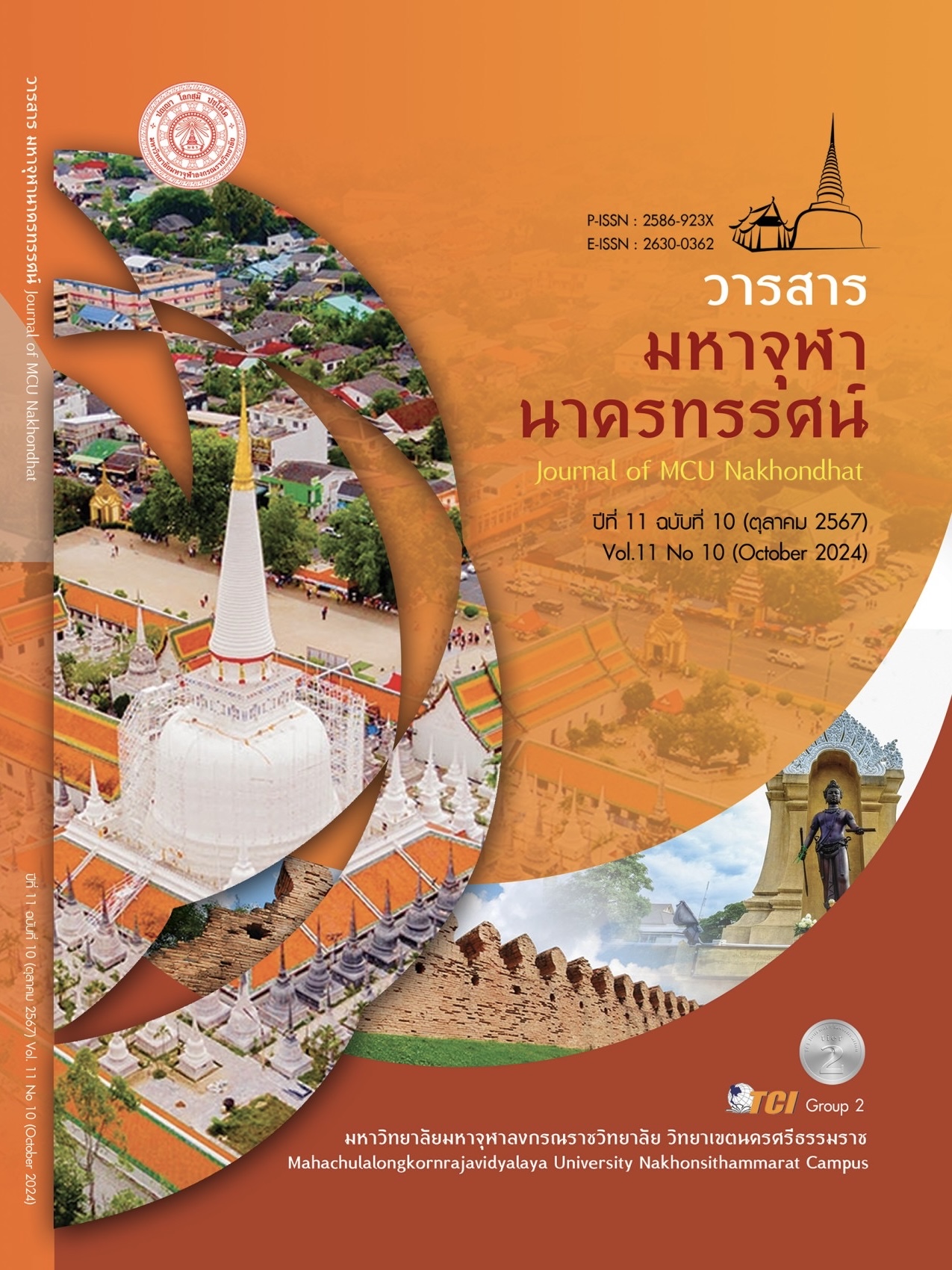TRANSFORMATIONAL LEADERSHIP IN THE BRITTLE, ANXIOUS, NON-LINEAR AND INCOMPREHENSIBLE (BANI) ERA AFFECTING TEACHER TEAMWORK PERFORMANCE IN SCHOOLS UNDER CHANTHABURI PRIMARY EDUCATIONAL SERVICE AREA OFFICE
Main Article Content
Abstract
The purposes of this research were to: 1) Study the level of transformational leadership in schools under Chanthaburi Primary Educational Area Office 2 in the brittle, anxious, non-linear and incomprehensible (BANI) era, 2) Study the level of teamwork performance of teachers in these schools, 3) Determine the relationship between transformational leadership in the BANI era and teamwork performance of teachers in these schools, and 4) Create a predictive equation for the transformational leadership in the BANI era affecting teacher teamwork performance in these schools. It is quantitative research. The instrument used in the study was a questionnaire with a sample of 285 people. The sample size was determined using Krejcie and Morgan's table, and stratified sampling by proportion was used, with districts as the strata. The statistics used for data analysis included: mean, standard deviation, Pearson's correlation coefficient, and multiple regression analysis. The research results found that: 1) Opinions about transformational leadership in the BANI era were at the high level ( = 4.46, S.D. = 0.46); 2) Opinions about teamwork performance of teachers were at the high level (
= 4.44, S.D. = 0.39); 3) There was a moderately positive correlation between transformational leadership in the BANI era and teamwork performance of teachers, which was statistically significant at the 0.01 level; and 4) Transformational leadership in the BANI era had a significantly positive effect on teamwork performance of teachers at the 0.05 level. The multiple correlation coefficient was 0.574, and the predictive power accounted for 32.90% of the teamwork performance of teachers. The forecast equation in raw score format was:
= 2.333 + 0.253 (X3) + 0.205 (X4), and the forecast equation in the form of a standardized score was:
= 0.331 (X3) + 0.262 (X4). The study results align with the objectives and hypotheses set.
Article Details

This work is licensed under a Creative Commons Attribution-NonCommercial-NoDerivatives 4.0 International License.
References
จิราเจต วิเศษดอนหวาย. (2566). ลาก่อน VUCA มาแล้ว BANI: ชวน ผอ. ปรับตัวและโรงเรียนให้ทันการเปลี่ยนแปลง. เรียกใช้เมื่อ 29 พฤษภาคม 2567 จาก https://www.educathai.com/knowledge/articles/652
ชนชญา สังข์พญา และโยธิน ศรีโสภา. (2559). ภาวะผู้นำการเปลี่ยนแปลงของผู้บริหารสถานศึกษาที่ส่งผลต่อประสิทธิภาพ การทำงานเป็นทีมของครู สังกัดสำนักงานเขตพื้นที่การศึกษามัธยมศึกษา เขต 9. วารสารศิลปากรศึกษาศาสตร์วิจัย, 8(2), 318-333.
ชวกิจ ทองนุ้ยพราหมณ์ และคณะ. (2566). ปัจจัยที่ส่งผลต่อประสิทธิภาพการทำงานเป็นทีมของครูในสถานศึกษาระดับมัธยมศึกษา สังกัดสำนักงานเขตพื้นที่การศึกษามัธยมศึกษาสมุทรปราการ. journal of Modern Learning Development, 8(7), 18-34.
ชูขวัญ รัตนพิทักษ์ธาดา และประทุมทอง ไตรรัตน์. (2566). สมรรถนะของผู้นำทางการศึกษาเพื่อการอยู่รอดและเติบโตในยุค BANI World. วารสารวิชาการสถาบันวิทยาการจัดการแห่งแปซิฟิค, 9(1), 16-28.
ณฏฐพร สิงห์สร และคณะ. (2567). ความฉลาดทางอารมณ์วิถีพุทธ: การบูรณาการหลักธรรมสู่การเป็นองค์กรแห่งความสุขยุคพลิกผัน. วารสารมหาจุฬานาครทรรศน์, 11(1), 250–259.
ทัศนี ไชยจิตร และคณะ. (2564). การศึกษาภาวะผู้นำการเปลี่ยนแปลงของผู้บริหารที่ส่งผลต่อประสิทธิภาพการทำงานเป็นทีมของครูโรงเรียนในอำเภอน้ำยืน สังกัดสำนักงานเขตพื้นที่การศึกษาประถมศึกษาอุบลราชธานี เขต 5. วารสารนวัตกรรมการศึกษาและการวิจัย, 5(1), 103-119.
บุญชม ศรีสะอาด. (2554). การวิจัยเบื้องต้น. (พิมพ์ครั้งที่ 9). กรุงเทพมหานคร: สุวีรียาสาส์น.
ปกรณ์ ประจันบาน. (2555). สถิติขั้นสูงสำหรับการวิจัยและประเมิน. (พิมพ์ครั้งที่ 4). พิษณุโลก: รัตนสุวรรณการพิมพ์.
พัณภัสสรา แก้วคำไสย์. (2567). การวิเคราะห์โมเดลสมการโครงสร้างการบริหารแบบมีส่วนร่วมภาวะผู้นำการเปลี่ยน แปลงและประสิทธิผลโรงเรียนสังกัดกรุงเทพมหานคร. Silpakorn University e-Journal (Social Sciences, Humanities, and Arts), 44(1), 95-110.
วรากรณ์ สามโกเศศ. (2565). กรอบคิดจาก VUCA สู่ BANI. เรียกใช้เมื่อ 29 พฤษภาคม 2567 จาก https://www.bangkokbiznews.com/columnist/1004689
ศุรางค์รัฐปรัชญา ปะตาทะยัง และคณะ. (2566). ความสัมพันธ์ระหว่างภาวะผู้นำทางวิชาการของผู้บริหารสถานศึกษากับประสิทธิภาพการทำงานเป็นทีมของครูในโรงเรียนสังกัดสำนักงานเขตพื้นที่การศึกษาประถมศึกษานครราชสีมา เขต 3. วารสารวิทยาลัยนครราชสีมา (สาขามนุษยศาสตร์และสังคมศาสตร์), 17(2), 436-451.
สมคิด ผลนิล และเฉลิมชัย กิตติศักดิ์นาวิน. (2559). การพัฒนาทรัพยากรมนุษย์และบรรยากาศองค์การที่มีอิทธิพลต่อการทำงานเป็นทีม กรณีศึกษากรมอุทยานแห่งชาติสัตว์ป่า และพันธุ์พืช. วารสารศิลปะศาสตร์ มหาวิทยาลัยอุบลราชธานี, 12(2), 109-135.
สานิตย์ หนูนิล. (2562). อิทธิพลของภาวะผู้นำการเปลี่ยนแปลงที่มีต่อความรับผิดชอบต่อสังคมขององค์กร: แนวคิดและการประยุกต์. Silpakorn University e-Journal (Social Sciences, Humanities, and Arts), 39(1), 63-74.
สำนักงานเขตพื้นที่การศึกษาประถมศึกษาจันทบุรี เขต 2. (2566ก). ข้อมูลพื้นฐานโรงเรียนในสังกัด. เรียกใช้เมื่อ 15 มกราคม 2567 จาก https://chanarea2.go.th/page_id=3411
สำนักงานเขตพื้นที่การศึกษาประถมศึกษาจันทบุรี เขต 2. (2566ข). รายงานผลแผนปฏิบัติราชการประจำปีงบประมาณ พ.ศ. 2566. เรียกใช้เมื่อ 15 มกราคม 2567 จาก https://chanarea2.go.th/wp-content/uploads/2023/06/1.รายงานผลแผนปฏิบัติราชการประจำปีงบประมาณพ.ศ.2566pdf.
Cox, T. H. (1994). Cultural Diversity in Organizations: Theory, Research & Practice. San Francisco, California: Berrett-Koehler.
Cronbach, L. J. (1990). Essentials of psychological testing. (5th ed.). New York: Harper Collins Publishers.
Goetsch, D. L. (2004). Effective Teamwork: Ten Steps for Technical Professions. Upper Saddle River, New Jersey: Prentice Hall.
Krejcie, R. V. & Morgan, D. W. (1970). Determining Sample Size for Research Activities. Educational and Psychological Measurement, 30(3), 607-610.
Likert, R. (1967). The Method of Constructing and Attitude Scale, in Attitude Theory and Measurement. New York: Wiley & Son.
Parker, G. & Kropp, R. (2001). Team Workout: A Trainer’s Sourcebook of Team-Building Games and Activities. New York: Amacom.


